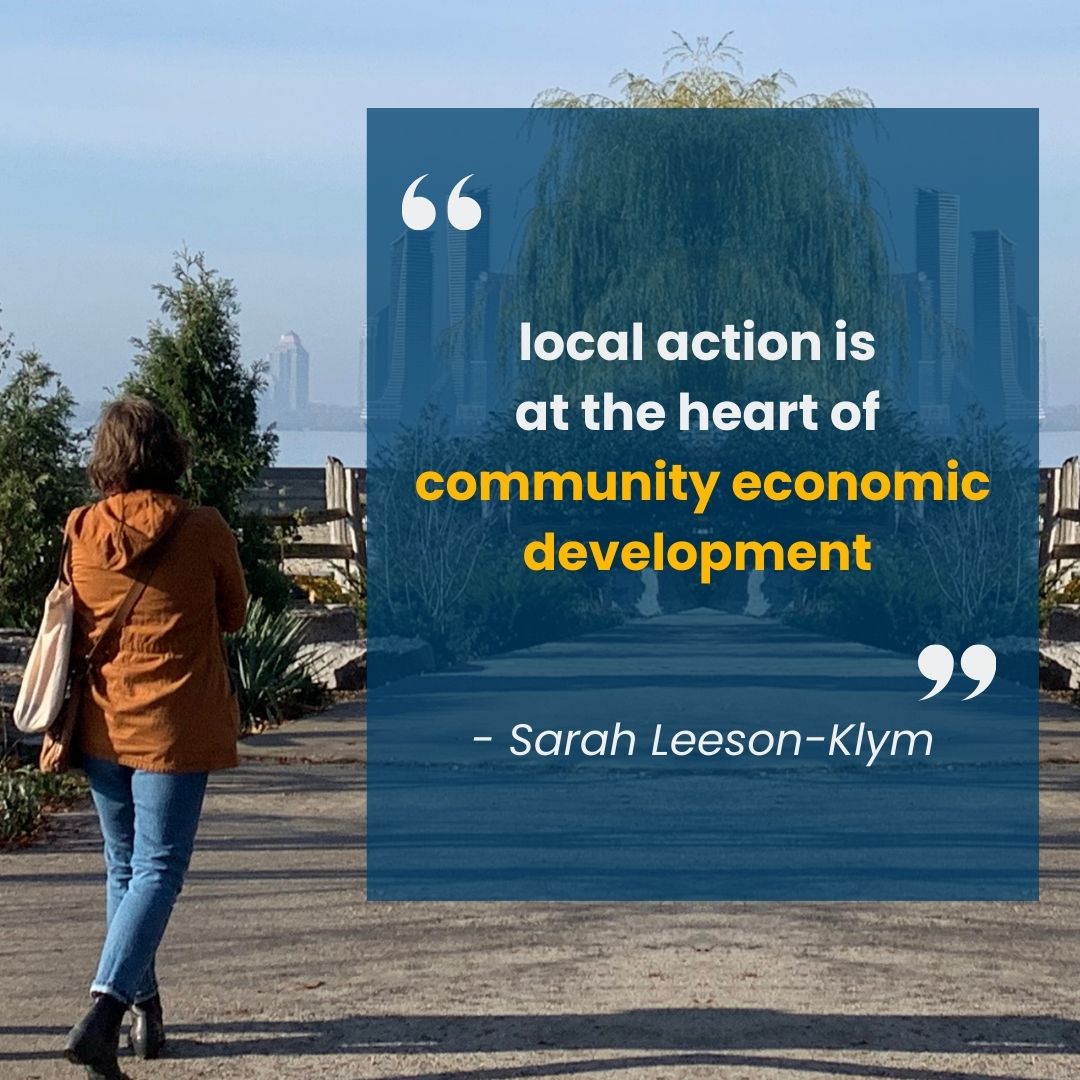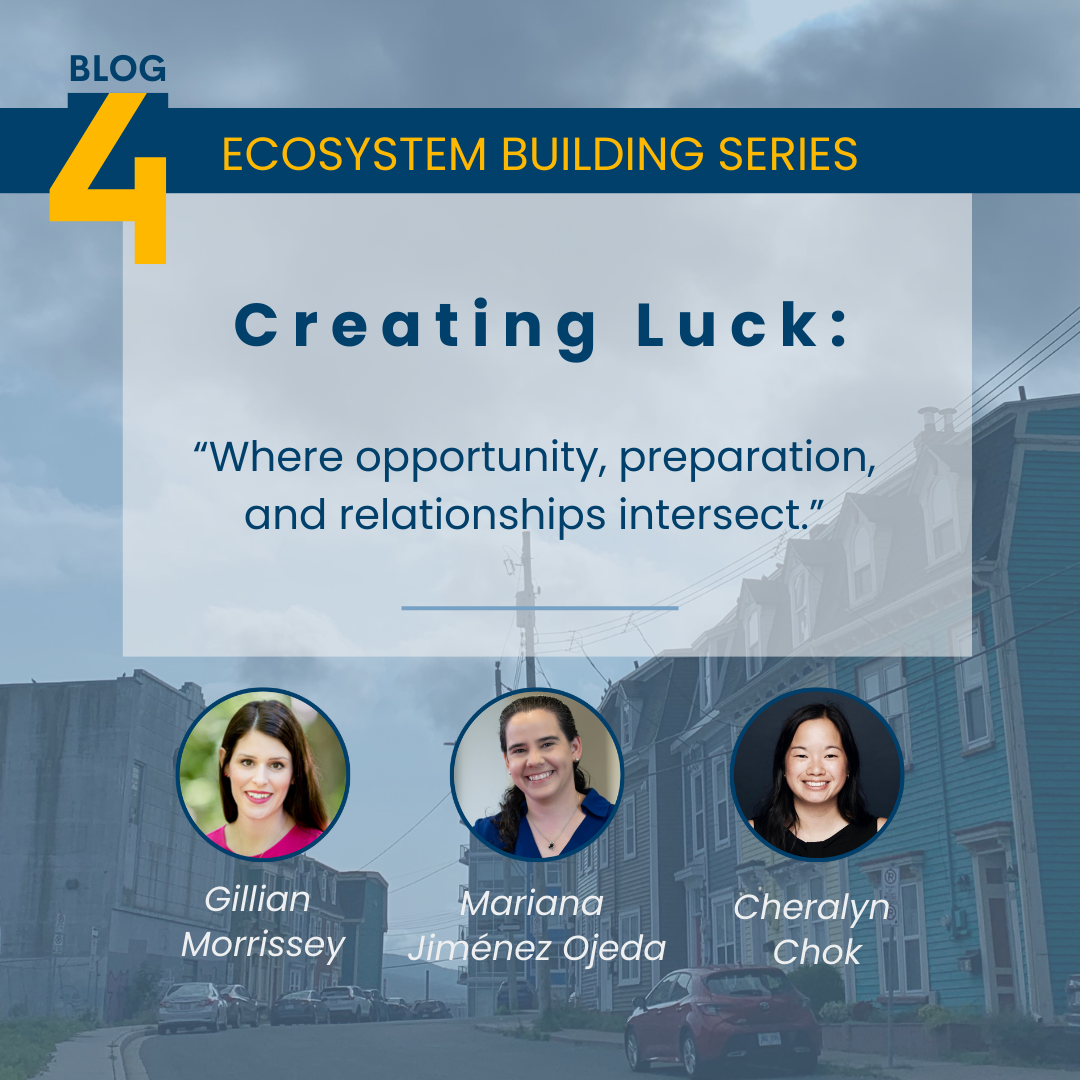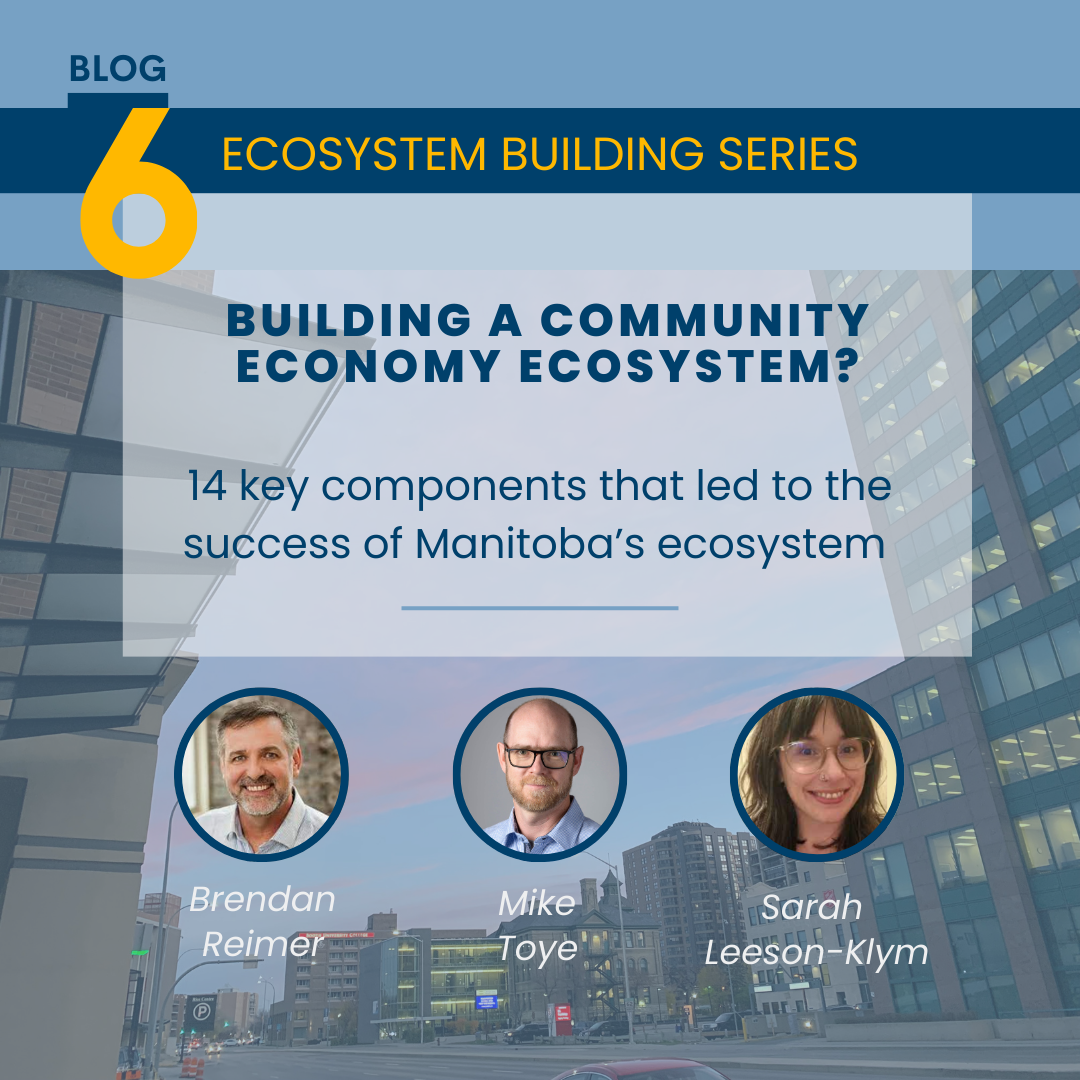Reflecting on CCEDNet’s Regional Initiatives Program
This is Part 7 of our Ecosystem Building Blog Series.
part 1) Pan Atlantic
part 2) Saskatchewan
part 3) Ontario
part 4) Newfoundland and Labrador – 1
part 5) Newfoundland and Labrador – 2
part 6) Manitoba
Ecosystem building is a core focus of CCEDNet’s Regional Initiatives Program.
Reflecting on CCEDNet’s
Regional Initiatives Program
Author:
Sarah Leeson-Klym, Associate Director
Blog Summary
Read this if you are:
- Questioning what ‘ecosystem building’ offers as a frame for action.
- Curious about what CCEDNet learned through the Regional Initiatives program
- Struggling to navigate the tensions of working at both local and large scales.
Near the end of the recent Regional Initiatives Program, we reflected on what we were learning. This reflection is mine but incorporates input from Melissa Sinfield (Regional Initiatives Manager) and Mike Toye (Executive Director) as well as themes throughout the rest of the Ecosystem Blog Series. On a personal note, I am so grateful to have worked with Mel on this program. We navigated a challenging time frame and complex environment together and their contributions were incredibly valuable. Thank you!
To learn more about ecosystem building projects and approaches that have been supported by CCEDNet check out our Regional Initiatives Program.
Reflecting on CCEDNet’s Regional Initiatives Program
CCEDNet’s most recent foray into regional ecosystem development can be traced back to two key moments – the launch of Inclusive Innovation and our first Investment Readiness Program project.
Despite being a national network, we have always had an interest in the regional scale because local action is at the heart of community economic development and these activities are often funded and regulated by provincial governments. I have sometimes considered this the work of building economies-of-network, as opposed to economies of scale. CCEDNet-Manitoba has become a sustained leader in this kind of regional ecosystem development, but otherwise we have seldom found support for a broad, connected approach to supporting relevant social economy action at this scale. So, of course we jumped at the chance to bring the network to the emerging Social Innovation and Social Finance Strategy opportunities, leading to our support of Flourish Alberta and the Regional Initiatives Program.
“
[W]e have always had an interest in the regional scale because local action is at the heart of community economic development…
“
“
[T]he field is always changing and the ideas, terms, and frameworks being used are fluid and contested.
“
One observation that is consistent over the resulting 5 years of work is that the field is always changing and the ideas, terms, and frameworks being used are fluid and contested. This is reflected in our practice. Some of the regional initiatives we’ve worked on have been directly organized as hubs of the CCEDNet membership. Others are partnerships with a mix of members and others and focus more on a frame of ecosystem building for social innovation, CED, or social economy. And, some have been direct projects delivered at a regional scale, like the Atlantic Social Succession Project aimed at supporting retiring businesses across the 4 Atlantic provinces to convert to social enterprises or co-operatives.
In the most recent Regional Initiatives project, we emphasized ecosystem building for social innovation and CED at provincial or pan-provincial scales and hosted an open intake. We were flooded with applications – 117 representing over 5 times the volume of funds available! From that huge response, we painstakingly selected 6 projects to complement CCEDNet-Manitoba and Flourish Alberta.
The application process itself was rich with learning about the diversity of perspectives and collaborative work taking place across the field. While ‘ecosystem building’ has gained steam as the predominant terminology for our work within the federal government’s strategy, it was clear this means a myriad of different things on the ground. Even what is meant by a ‘regional’ scale differs – with some provinces using this to describe a municipal level and others thinking about collaboration across multiple provinces with similar concerns. But setting these observations aside, there is clear interest and need for resources to work collaboratively at this middle scale between front-line and federal.
“
While ‘ecosystem building’ has gained steam as the predominant terminology… it was clear this means a myriad of different things on the ground.
“
If this work interests you, read the whole blog series! There are incredible insights and successes to learn from throughout. We benefited from our partners’ bright minds and willingness to meet together over the course of the project to share with each other. So, to wrap up these blogs, we’ve drawn together some overarching insights that will help us build towards future regional organizing efforts.
- Despite some confusion about the language, ecosystems are all around us and this framework can help us organize effort. Being aware of the overlapping systems and factors that inhibit or enable change is an essential first step to shifting practices towards the outcomes we seek. This article is a good introduction. As mentioned in this blog, it can be seen as a collaborative response to systemic problems. There are many examples of the range of functions needed to create viable social innovation and social finance ecosystems, such as the Inclusive Innovation report, the OECD Recommendation on the social and solidarity economy and social innovation, and the UN Resolution supporting the social and solidarity economy.
- Despite the challenges involved, we remain sure that the regional/provincial level of organizing is effective for ecosystem functions related to capacity building and information sharing (making consistent connection easier), and policy change efforts directed at provincial governments, which hold more relevant levers than the federal government. This work is important.
- We still aren’t sure how to connect different regional efforts for translocal learning or to build collective capacity and power to influence policy and the economy at a national scale. Maintaining needed local autonomy while also integrating federally is a perennial organizing conundrum.
- Local leadership and investment is essential. This isn’t about imposing top-down strategies from away. It’s an approach to change that has demonstrated success, and requires strong, engaged, accountable local leadership to implement at provincial levels.
- This work requires real resources that aren’t premised on project deliverables, instead providing a stable base for relationship building, collective reflection, experimentation, and routine convening of practitioners and supporters to inform strategy. Currently, this kind of funding is significantly lacking across the country.
We are inspired by the efforts of our regional partners and grateful to have had time to connect beyond our sustained efforts in Manitoba and Alberta. CCEDNet will be bringing these lessons into our Strategic Review as we focus our efforts on the next 25 years of connecting people and ideas for economic action towards inclusive, equitable, and sustainable communities.












